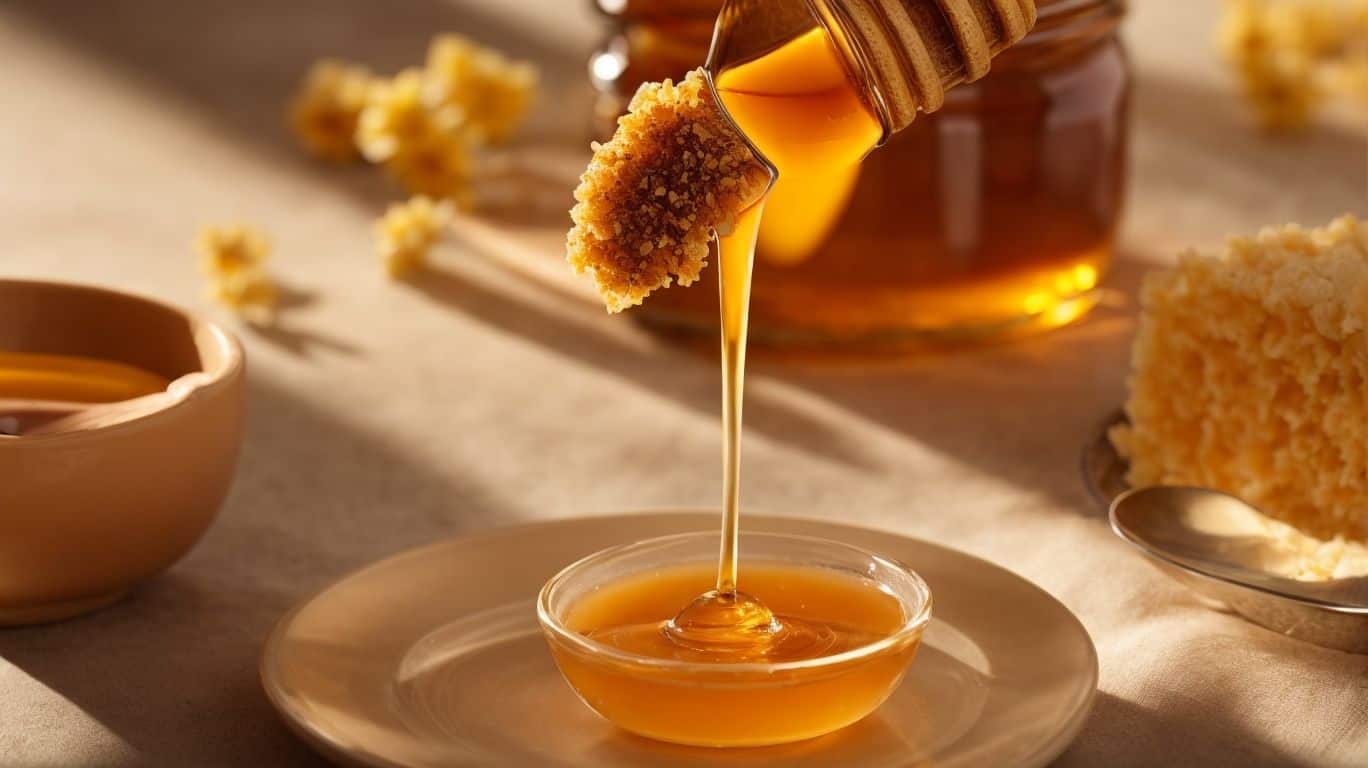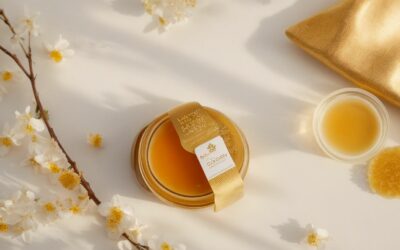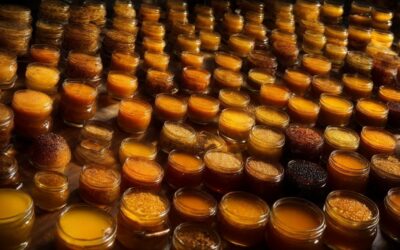Manuka honey, also known as the “sweet superfood,” is a type of honey produced in New Zealand and Australia by bees that pollinate the Manuka bush.
It has been used for centuries by the indigenous Māori people for its medicinal properties and has recently gained popularity worldwide for its numerous health benefits, according to NCBI.
What makes Manuka honey unique is its high levels of a compound called methylglyoxal (MGO), which is responsible for its antibacterial and anti-inflammatory properties.
What Is Manuka Honey?
Manuka honey is a type of honey native to New Zealand, known for its many health benefits and distinctive properties. But what exactly is Manuka honey?
It is a special type of honey produced by bees that pollinate the Manuka bush (Manuka tree), containing methylglyoxal, a compound that gives it its antibacterial properties.
This superfood is highly sought after for its potential to aid in wound healing, alleviate sore throats, and promote overall well-being.
What Makes Manuka Honey Unique?
Manuka honey’s distinctiveness stems from its powerful antibacterial properties, thanks to the presence of methylglyoxal.
This compound is abundant in Manuka honey, giving it remarkable healing capabilities.
Furthermore, Manuka honey contains special enzymes that are not found in other types of honey, enhancing its health benefits.
Pro-tip: When purchasing Manuka honey, opt for a UMF (Unique Manuka Factor) rating of 10 or higher to reap the full therapeutic effects.
What Are the Health Benefits of Manuka Honey?
Manuka honey has been touted as a superfood for its numerous health benefits. This section will delve into the specific advantages that this sweet nectar can offer.
From its powerful antibacterial properties to its ability to aid in wound healing, we will explore the different ways that manuka honey can improve your health.
Additionally, we will discuss its anti-inflammatory effects and how it can promote digestive health.
- Antibacterial Properties
- Anti-inflammatory Properties
- Wound Healing
- Digestive Health
Read more to find out about all the health benefits of Manuka honey.
How Is Manuka Honey Rated and Graded?
- Rating: Manuka honey is rated based on the Unique Manuka Factor (UMF) and Methylglyoxal (MGO) content.
- Grading: UMF ratings reflect purity and quality, while MGO measures antibacterial strength.
- Factors: Consider UMF 10+ for general wellness and UMF 20+ for higher therapeutic benefits.
A friend used UMF 15+ Manuka honey to heal a persistent wound, and the results were remarkable. The antibacterial properties truly made a difference.
What Is the UMF Rating System?
The UMF rating system is used to measure the unique manuka factor in honey, which indicates its purity and quality. It evaluates the levels of key compounds such as Methylglyoxal and Dihydroxyacetone.
The higher the UMF rating, the stronger the honey’s antibacterial properties. UMF 10+ is recommended for general use, while UMF 16+ is ideal for therapeutic purposes.
When choosing manuka honey, it is important to prioritize UMF-certified products to ensure their authenticity and effectiveness in providing health benefits.
What Is the MGO Rating System?
The MGO rating system is used to measure the methylglyoxal concentration in manuka honey, which indicates its level of antibacterial strength. The higher the MGO levels, the more potent the honey is against bacteria.
For example, HGO 400+ is suitable for general well-being, while MGO 800+ is ideal for therapeutic use.
How Can You Use Manuka Honey?
Manuka honey has been gaining popularity as a superfood in recent years, known for its unique health benefits and delicious taste.
But how exactly can you incorporate this sweet superfood into your daily routine?
In this section, we will discuss three ways you can use manuka honey – as a natural sweetener, as a face mask, and as a treatment for sore throat.
Each method offers its own set of benefits, making manuka honey a versatile and valuable addition to your pantry.
1. As a Natural Sweetener
- Replace sugar with manuka honey as a natural sweetener in beverages and baked goods for a healthier alternative.
- Use manuka honey to sweeten yogurt, oatmeal, or fruit salads naturally.
- Blend manuka honey into smoothies or salad dressings as a natural sweetener for added sweetness and health benefits.
2. As a Face Mask
- Cleanse your face with a gentle cleanser to remove any dirt and impurities.
- Apply a thin layer of Manuka honey evenly onto your face, avoiding the delicate eye area.
- Leave the honey on for 15-20 minutes to allow its beneficial properties to be absorbed by the skin.
- Rinse off the honey using warm water and gently pat your face dry with a clean towel.
- For best results, use this process as a face mask 1-2 times per week to achieve soft, supple, and glowing skin.
3. As a Treatment for Sore Throat
- To treat a sore throat, try consuming 1-2 tablespoons of manuka honey directly.
- Create a soothing drink by mixing manuka honey with warm water or herbal tea.
- Alleviate throat irritation by blending manuka honey with lemon juice and warm water.
Are There Any Side Effects of Manuka Honey?
Side effects of Manuka honey are rare, although some individuals may experience allergic reactions or digestive issues if consumed in large quantities.
It is recommended that those who are allergic to bees avoid Manuka honey to prevent any potential adverse reactions.
Fact: For centuries, Manuka honey has been utilized for its natural antibacterial properties in the treatment of wounds and infections.
Where Can You Buy Manuka Honey?
You can purchase Manuka honey from specialty health food stores, online retailers, or directly from beekeepers.
Be sure to choose reputable brands such as New Zealand Honey Co. to guarantee the authenticity and high quality of the product.
You can also buy it on Amazon.com.
Frequently Asked Questions
What is Manuka Honey?
Manuka honey is a specialized type of honey produced by bees that pollinate the Manuka plants in New Zealand. It is widely considered a superfood for its unique and beneficial properties.
What makes Manuka Honey a superfood?
Manuka honey has been used for centuries by the Maori community in New Zealand for its healing and anti-bacterial properties. It has a higher concentration of the active ingredient methylglyoxal (MGO) than traditional honey, making it a powerful germ fighter and wound treatment.
How is Manuka Honey used?
Manuka honey can be consumed on its own, added to food or drinks, or used topically on the skin. It is commonly used as a natural antibiotic to treat sore throats, digestive problems, and minor cuts. It can also be used as a healing remedy for skin conditions like acne and eczema.
Is there scientific evidence to support the use of Manuka Honey?
Some studies have found that Manuka honey has anti-bacterial, anti-inflammatory, and antioxidant properties. It has also been shown to aid in wound healing and reducing inflammation in the body. However, more research is needed to fully understand its potential benefits.
Is Manuka Honey safe for everyone to use?
Manuka honey is generally safe for consumption, but it should be used with caution in people with allergies to bees or honey. It is also important to consult with a healthcare professional before using Manuka honey for any medical conditions.
How do I know I am getting real Manuka Honey?
Proper Manuka honey comes from New Zealand and will have a UMF (Unique Manuka Factor) rating of 10+ or more on its label. Cheaper imitations may not have the same healing benefits. It is important to purchase Manuka honey from a reputable source and look for the UMF rating on the label.
I’m a Manuka honey enthusiast and creator of Manuka Honey Organic, a blog where I share my journey with authentic Manuka honey from New Zealand. I want everyone to learn about the healing powers of Manuka honey.





